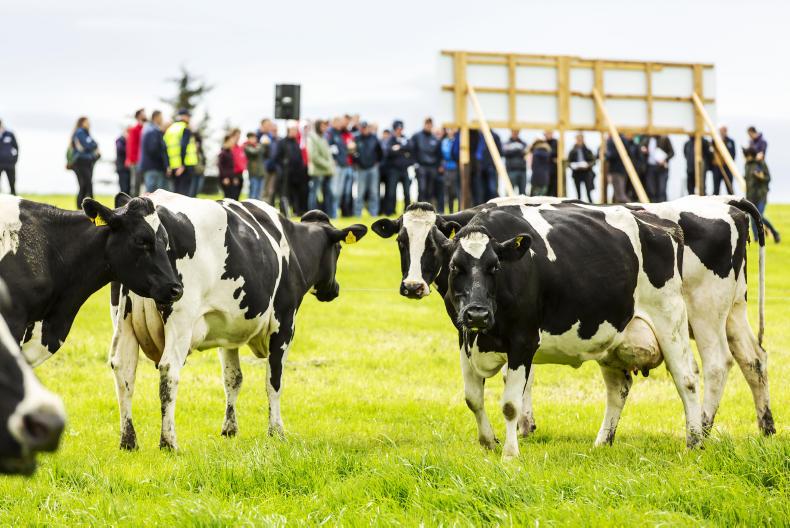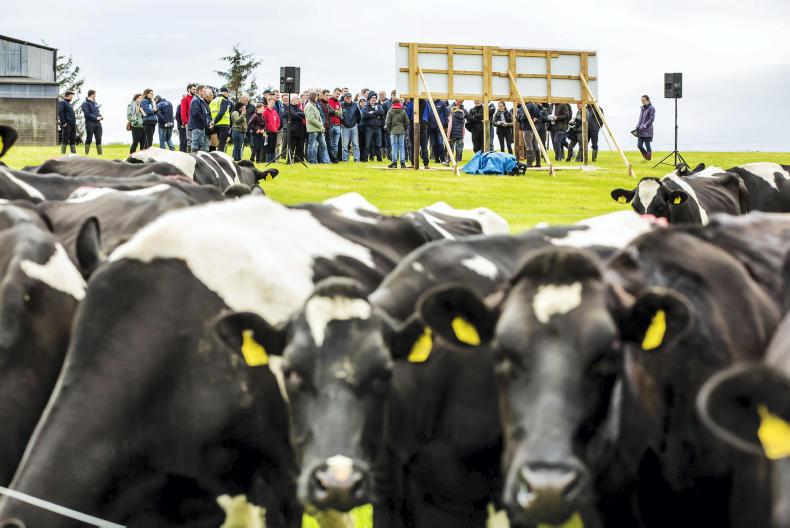Alternative ways to wash milking equipment was one of the key messages for farmers at a farm walk on the McKenna farm in Monaghan last week. The McKennas were the winners of the NDC/Kerrygold quality milk awards for 2018.

NDC award-winning family Darren McKenna, Denise McKenna, Daithí (eldest son), Caragh (daughter), Micheál (youngest son), and Annie (four-year-old daughter), with judges Jack Kennedy, David Gleeson, Teagasc; and Pat Wall, UCD. \ Philip Doyle
David Gleeson, the Teagasc dairy equipment cleaning expert, explained that chlorine-based milking equipment wash routines will be banned within two years. Chlorine is being banned because it is becoming increasingly difficult to meet chlorine residue specifications in butter and infant milk formula when chlorine is used.
Caustic is the main alternative to chlorine but relying on caustic will require more hot washes, more acid washes, no recycling of wash liquid and in many cases extra rinses with peracetic acid.
David said powder-based caustic products have a high caustic content and are generally good at cleaning equipment when combined with either a hot acid wash three times per week, including peracetic acid in the final rinse or adding hydrogen peroxide to the diluted powder solution once a week.
The percentage of caustic in liquid products is usually less than it is in powder products so more acid washes are required when using liquid products. One option is to use the liquid caustic four mornings a week and use phosphoric acid three mornings a week, all in hot water. The caustic liquid product can be used in cold water each evening. Alternatively, use the caustic liquid in hot water seven mornings a week and use it in cold water seven evenings a week. An additional rinse with peracetic acid should be used after each milking.

David said he is trialling new acid-based “one-for-all” products that give an acid descale and detergent. He said initial results look good, but he needs to look out for other residues.
“Hot water at the correct temperature is critical. The water should be 800C on the way in and 500C on the way out,” David said. The host farmer, Darran McKenna has a long history of producing excellent quality milk. Average milk quality in 2017, the year the award is based on, shows TBC of 8,000, SCC of 86,000 and a thermoduric of 175,000. He is currently using a detergent steriliser with 2.5% chlorine but will shortly switch to chlorine-free for milking machine and bulk tank wash routines.

Teagasc adviser Tom O’Dywer talks to visitors on the National Dairy Council farm walk on the farm of the McKenna family, national winners of the 2018 NDC Kerrygold Quality Milk Awards. The McKennas dairy farm is in Derrygasson, Emyvale, Co Monaghan \ Philip Doyle
Alternative ways to wash milking equipment was one of the key messages for farmers at a farm walk on the McKenna farm in Monaghan last week. The McKennas were the winners of the NDC/Kerrygold quality milk awards for 2018.

NDC award-winning family Darren McKenna, Denise McKenna, Daithí (eldest son), Caragh (daughter), Micheál (youngest son), and Annie (four-year-old daughter), with judges Jack Kennedy, David Gleeson, Teagasc; and Pat Wall, UCD. \ Philip Doyle
David Gleeson, the Teagasc dairy equipment cleaning expert, explained that chlorine-based milking equipment wash routines will be banned within two years. Chlorine is being banned because it is becoming increasingly difficult to meet chlorine residue specifications in butter and infant milk formula when chlorine is used.
Caustic is the main alternative to chlorine but relying on caustic will require more hot washes, more acid washes, no recycling of wash liquid and in many cases extra rinses with peracetic acid.
David said powder-based caustic products have a high caustic content and are generally good at cleaning equipment when combined with either a hot acid wash three times per week, including peracetic acid in the final rinse or adding hydrogen peroxide to the diluted powder solution once a week.
The percentage of caustic in liquid products is usually less than it is in powder products so more acid washes are required when using liquid products. One option is to use the liquid caustic four mornings a week and use phosphoric acid three mornings a week, all in hot water. The caustic liquid product can be used in cold water each evening. Alternatively, use the caustic liquid in hot water seven mornings a week and use it in cold water seven evenings a week. An additional rinse with peracetic acid should be used after each milking.

David said he is trialling new acid-based “one-for-all” products that give an acid descale and detergent. He said initial results look good, but he needs to look out for other residues.
“Hot water at the correct temperature is critical. The water should be 800C on the way in and 500C on the way out,” David said. The host farmer, Darran McKenna has a long history of producing excellent quality milk. Average milk quality in 2017, the year the award is based on, shows TBC of 8,000, SCC of 86,000 and a thermoduric of 175,000. He is currently using a detergent steriliser with 2.5% chlorine but will shortly switch to chlorine-free for milking machine and bulk tank wash routines.

Teagasc adviser Tom O’Dywer talks to visitors on the National Dairy Council farm walk on the farm of the McKenna family, national winners of the 2018 NDC Kerrygold Quality Milk Awards. The McKennas dairy farm is in Derrygasson, Emyvale, Co Monaghan \ Philip Doyle









 This is a subscriber-only article
This is a subscriber-only article










SHARING OPTIONS: